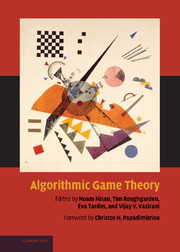Book contents
- Frontmatter
- Contents
- Foreword
- Preface
- Contributors
- I Computing in Games
- II Algorithmic Mechanism Design
- III Quantifying the Inefficiency of Equilibria
- 17 Introduction to the Inefficiency of Equilibria
- 18 Routing Games
- 19 Network Formation Games and the Potential Function Method
- 20 Selfish Load Balancing
- 21 The Price of Anarchy and the Design of Scalable Resource Allocation Mechanisms
- IV Additional Topics
- Index
17 - Introduction to the Inefficiency of Equilibria
from III - Quantifying the Inefficiency of Equilibria
Published online by Cambridge University Press: 31 January 2011
- Frontmatter
- Contents
- Foreword
- Preface
- Contributors
- I Computing in Games
- II Algorithmic Mechanism Design
- III Quantifying the Inefficiency of Equilibria
- 17 Introduction to the Inefficiency of Equilibria
- 18 Routing Games
- 19 Network Formation Games and the Potential Function Method
- 20 Selfish Load Balancing
- 21 The Price of Anarchy and the Design of Scalable Resource Allocation Mechanisms
- IV Additional Topics
- Index
Summary
Abstract
This chapter presents motivation and definitions for quantifying the inefficiency of equilibria in noncooperative games. We illustrate the basic concepts in four fundamental network models, which are studied in depth in subsequent chapters. We also discuss how measures of the inefficiency of equilibria can guide mechanism and network design.
Introduction
The Inefficiency of Equilibria
The previous two parts of this book provided numerous examples demonstrating that the outcome of rational behavior by self-interested players can be inferior to a centrally designed outcome. This part of the book is devoted to the question: by how much?
To begin, recall the Prisoner's Dilemma (Example 1.1). Both players suffer a cost of 4 in the unique Nash equilibrium of this game, while both could incur a cost of 2 by coordinating. There are several ways to formalize the fact that the Nash equilibrium in the Prisoner's Dilemma is inefficient. A qualitative observation is that the equilibrium is strictly Pareto inefficient, in the sense that there is another outcome in which all of the players achieve a smaller cost. This qualitative perspective is particularly appropriate in applications where the “cost” or “payoff” to a player is an abstract quantity that only expresses the player's preferences between different outcomes. However, payoffs and costs have concrete interpretations in many applications, such as money or the delay incurred in a network.
Information
- Type
- Chapter
- Information
- Algorithmic Game Theory , pp. 443 - 460Publisher: Cambridge University PressPrint publication year: 2007
Accessibility standard: Unknown
Why this information is here
This section outlines the accessibility features of this content - including support for screen readers, full keyboard navigation and high-contrast display options. This may not be relevant for you.Accessibility Information
- 35
- Cited by
